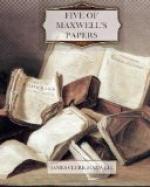If this is really the state of things to which we are approaching, our Laboratory may perhaps become celebrated as a place of conscientious labour and consummate skill, but it will be out of place in the University, and ought rather to be classed with the other great workshops of our country, where equal ability is directed to more useful ends.
But we have no right to think thus of the unsearchable riches of creation, or of the untried fertility of those fresh minds into which these riches will continue to be poured. It may possibly be true that, in some of those fields of discovery which lie open to such rough observations as can be made without artificial methods, the great explorers of former times have appropriated most of what is valuable, and that the gleanings which remain are sought after, rather for their abstruseness, than for their intrinsic worth. But the history of science shews that even during that phase of her progress in which she devotes herself to improving the accuracy of the numerical measurement of quantities with which she has long been familiar, she is preparing the materials for the subjugation of new regions, which would have remained unknown if she had been contented with the rough methods of her early pioneers. I might bring forward instances gathered from every branch of science, shewing how the labour of careful measurement has been rewarded by the discovery of new fields of research, and by the development of new scientific ideas. But the history of the science of terrestrial magnetism affords us a sufficient example of what may be done by Experiments in Concert, such as we hope some day to perform in our Laboratory.
That celebrated traveller, Humboldt, was profoundly impressed with the scientific value of a combined effort to be made by the observers of all nations, to obtain accurate measurements of the magnetism of the earth; and we owe it mainly to his enthusiasm for science, his great reputation and his wide-spread influence, that not only private men of science, but the governments of most of the civilised nations, our own among the number, were induced to take part in the enterprise. But the actual working out of the scheme, and the arrangements by which the labours of the observers were so directed as to obtain the best results, we owe to the great mathematician Gauss, working along with Weber, the future founder of the science of electro-magnetic measurement, in the magnetic observatory of Gottingen, and aided by the skill of the instrument-maker Leyser. These men, however, did not work alone. Numbers of scientific men joined the Magnetic Union, learned the use of the new instruments and the new methods of reducing the observations; and in every city of Europe you might see them, at certain stated times, sitting, each in his cold wooden shed, with his eye fixed at the telescope, his ear attentive to the clock, and his pencil recording in his note-book the instantaneous position of the suspended magnet.




